 Petzlover
Petzlover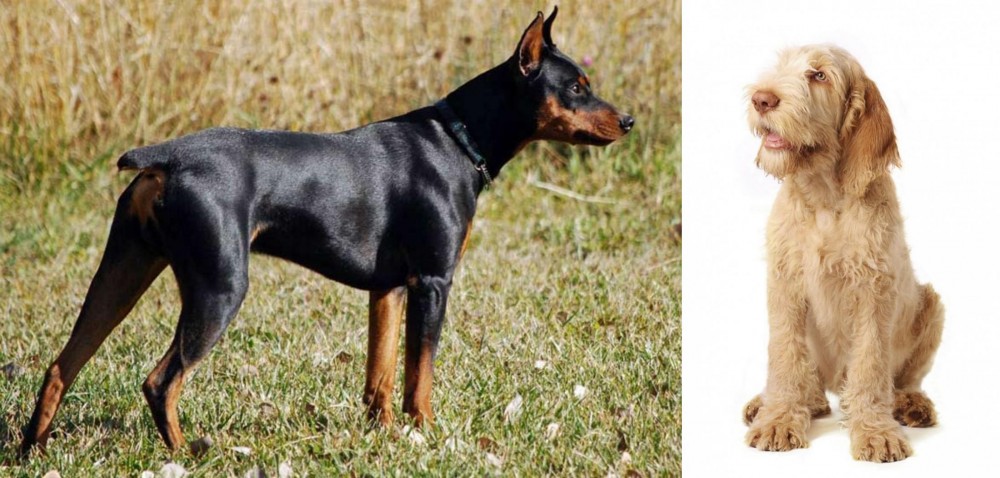 German Pinscher is originated from Germany but Spinone Italiano is originated from Italy. German Pinscher may grow 20 cm / 7 inches shorter than Spinone Italiano. German Pinscher may weigh 19 kg / 41 pounds lesser than Spinone Italiano. German Pinscher may live 5 years more than Spinone Italiano. German Pinscher may have less litter size than Spinone Italiano. German Pinscher requires Low Maintenance. But Spinone Italiano requires Moderate Maintenance
German Pinscher is originated from Germany but Spinone Italiano is originated from Italy. German Pinscher may grow 20 cm / 7 inches shorter than Spinone Italiano. German Pinscher may weigh 19 kg / 41 pounds lesser than Spinone Italiano. German Pinscher may live 5 years more than Spinone Italiano. German Pinscher may have less litter size than Spinone Italiano. German Pinscher requires Low Maintenance. But Spinone Italiano requires Moderate Maintenance
 The German Pinscher or Deutscher Pinscher originates in Germany. When you look at the dog you can see the the Doberman, the Rottweiler, Schnauzer, Affenpinscher and Miniature Pinscher have all played a role in the dog’s development.
The German Pinscher or Deutscher Pinscher originates in Germany. When you look at the dog you can see the the Doberman, the Rottweiler, Schnauzer, Affenpinscher and Miniature Pinscher have all played a role in the dog’s development.
There have been drawings of the German Pinscher which have been seen in dog books as early as 1884 and some drawings even earlier than this date. The dogs have descended from early European herding breeds.
The German Pinscher came to breeders of the United States in the 1980s, and the German Pinscher Club of America was started by German Pinscher fanciers, with the dog gaining acceptance by the Canadian Kennel Club in 2000.
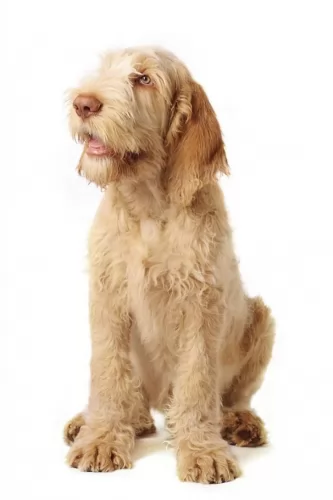 This Italian breed has an ancient blood line tracing all the back to 500 BC. Originally bred to hunt, he is today a friendly, alert and loyal companion. He is intelligent enough to do any job you give him. The Spinone is thought to be one of the oldest gun dogs ever, but it is not entirely clear that he came from Italy. There are some who think he may have come from somewhere in these European countries – Italy, Greece, France, Celtic Ireland, Spain or Russia. However, most believe the breed came from Italy in the Piedmont area.
This Italian breed has an ancient blood line tracing all the back to 500 BC. Originally bred to hunt, he is today a friendly, alert and loyal companion. He is intelligent enough to do any job you give him. The Spinone is thought to be one of the oldest gun dogs ever, but it is not entirely clear that he came from Italy. There are some who think he may have come from somewhere in these European countries – Italy, Greece, France, Celtic Ireland, Spain or Russia. However, most believe the breed came from Italy in the Piedmont area.
The most common thinking is that he is a descendent of the Spanish Pointer and/or the Russian Setter. One other theory is that setters from Greece were brought to the Roman Empire and crossed with a variety of Italian dog to make the coarse haired Spinone we see today. Then the French put in their claim that the breed is a cross of many French pointers.
The theory that counts might just belong to the Italians who believe the ancestor to the Spinone includes the German Wirehaired Pointer, the Pudelpointer and the Wirehaired Pointer. It was not until the 19th century that the name Spinone was officially given to the breed.
Before that it might have been known as a Spinoso and named after a thorn bus in Italy called the Spino. This bush was so thick and sharp that small prey animals learned to hide under it because the predators could not get through it. The Spinone however was able to fight through the briars with its thick, coarse hair and tough skin.
The breed almost became extinct during the second world war as before and after the hunters in Italy had started to use other breeds for hunting. Breeders also began to cross the Spinone with wire hairs like German Wirehaired Pointer, the Wirehaired Pointing Griffon and the Boulet.
The most popular hunting dog in Italy today is the Bracco Italiano while the Spinone is still used for hunting.
 The German Pinscher is a medium sized dog with a square build, looking very much like the Doberman Pinscher we know so well, but slightly smaller. Dogs and bitches stand roughly 45 to 50cm at the withers and the dog weighs between 14 to 20kg.
The German Pinscher is a medium sized dog with a square build, looking very much like the Doberman Pinscher we know so well, but slightly smaller. Dogs and bitches stand roughly 45 to 50cm at the withers and the dog weighs between 14 to 20kg.
The dog is lean and muscular with a tight fitting skin. He has a short, smooth coat which can be brown, reddish brown or black and tan. He has a black nose, dark eyes and he has either high set drop ears or the ears are specifically erect.
In fact, with German Pinschers, they have always had their ears cropped and their tails docked, but these days the tail is left and unfortunately that distinctive look is gone.
Energetic, spirited, lively, confident, intelligent, fearless and loyal are just some of the characteristics of this amazing dog who is guaranteed to make you an excellent watchdog and companion.
The German Pinscher is a playful, good natured dog and he’ll make a good pet for households where there are other pets as well as children. He is a loving and loyal companion with an even temperament, although he is strong-willed and stubborn and will therefore need training and socialization. He then becomes a super obedient pet.
He can fit into city- or country life but he is an energetic dog and will certainly require being exercised every day. Like any other dog, he can become bored and frustrated when put into the backyard and left there by himself day after day.
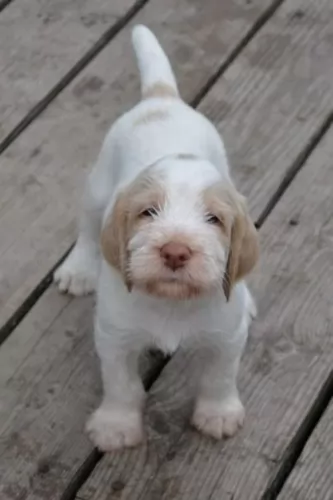 The breed is made up of strong, solid and muscled dogs that have an almost square build. His legs are made to travel any terrain and his head is long with an occipital that is pronounced and unique to the Spinone. They are said to have “human appearing eyes”, with a docked tail in countries allowing it and webbed paws.
The breed is made up of strong, solid and muscled dogs that have an almost square build. His legs are made to travel any terrain and his head is long with an occipital that is pronounced and unique to the Spinone. They are said to have “human appearing eyes”, with a docked tail in countries allowing it and webbed paws.
Shorter hair covers their feet, head, legs, muzzle and ears. They have longer hair on their eyebrows and it is stiff, with soft hair on the muzzle and cheeks with a beard and mustache. It is a single coated dog though the coat is rough. They should have skin, lips, nose, and pads in colors that coordinate with their coats. For white dog it is a red-orange color, brown in dogs that are roan colored and dark red-orange in the orange and white colored dog.
 The German Pinscher is a working dog bounding in energy. He just loves being involved with all the activities of his human family.
The German Pinscher is a working dog bounding in energy. He just loves being involved with all the activities of his human family.
He is playful and assertive and will require a firm, balanced owner who is consistent with the rules laid down for the dog. It will be more than worthwhile having him trained and socialized as he becomes obedient, loyal and devoted.
He is intelligent and quick to learn and it simply turns him into a splendid pet. Add him to your family, and you’ll feel as though you’ve added a wonderful dimension to your home.
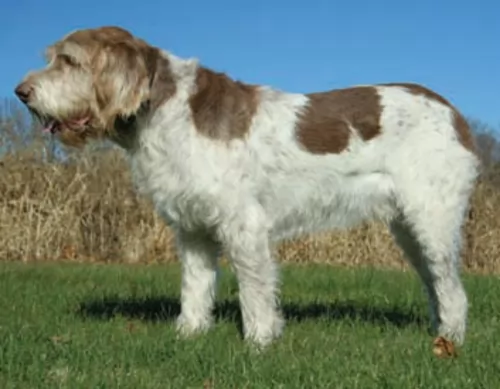 3.Adaptability – Young dogs need a lot of attention but they don’t need a lot of space. The young dogs are energetic while the adult dogs are laid-back. They need exercise every day and at least a small back yard.
3.Adaptability – Young dogs need a lot of attention but they don’t need a lot of space. The young dogs are energetic while the adult dogs are laid-back. They need exercise every day and at least a small back yard.
 When you see your German Pinscher standing lean and strong, you can’t think of him ever getting an illness. And yet, even a strong dog like this, who can reach 10 – 14 years of age with good nutrition, can get sick.
When you see your German Pinscher standing lean and strong, you can’t think of him ever getting an illness. And yet, even a strong dog like this, who can reach 10 – 14 years of age with good nutrition, can get sick.
Look out for von Willebrand's blood-clotting disorder as well as heart disease and hip dysplasia with your German Pinscher.
This is a blood disease where there is a deficiency of von Willebrand Factor which results in the blood not clotting properly. The condition can lead to excessive bleeding with your pet after he has had an injury for instance.
You may notice bleeding from the gums, bloody urine or feces as well as bruising of the skin. Get him to the vet who will perform an examination of your pet.
Remember that some health problems seen in a dog are inherited, and if you can get certificates from the breeders proving that the parents have been cleared of hereditary eye diseases, hip dysplasia and blood clotting disease for instance, your dog will have less risks of developing any of these serious conditions.
Also many illnesses can be eliminated by providing your pet with excellent food, clean water, a warm dry place to sleep and lots of love and attention.
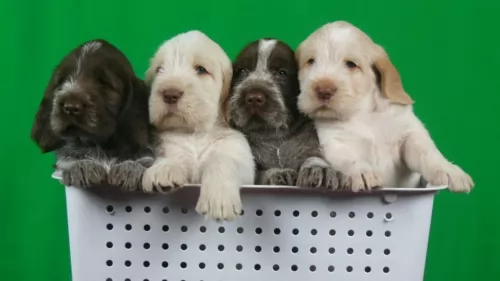 This is an ancient breed with not a lot of documented genetic issues, but it does have one deadly condition.
This is an ancient breed with not a lot of documented genetic issues, but it does have one deadly condition.
• Cerebellar ataxia (CA) is inherited and hits the puppies. Because it is a recessive gene both the mother and father must carry it for the puppy to inherit it. This makes it less likely than it would be otherwise. Puppies with the condition do not live more than a year. Since it is a genetic problem there is now a test for it that identifies carriers at a 95% accuracy rate.
• Like many other large breed dogs, they are susceptible to hip dysplasia. This can cause arthritis and/or lameness. There are now hip replacement surgeries available for this condition.
• Bloat is again common in large dogs and you need to watch for it with the Spinone. It can be deadly if not treated immediately. Let your dog rest quietly after eating. Do not let her exercise or play energetically after eating.
 The German Pinscher, because he is a muscular, energetic dog, should be fed a high-quality dog food that suits his size and his energy levels. If you feed him one of the commercially manufactured dog foods, make sure of the ingredients, as you don’t want food that is full of fillers, colorants and preservatives.
The German Pinscher, because he is a muscular, energetic dog, should be fed a high-quality dog food that suits his size and his energy levels. If you feed him one of the commercially manufactured dog foods, make sure of the ingredients, as you don’t want food that is full of fillers, colorants and preservatives.
Choose high quality foods and sometimes mix in your own home cooked brown rice, vegetables and chicken. Adding in some raw meat occasionally will enhance his health too and help him towards staving off common dog illnesses. He should always have access to fresh, cool water.
He is a high energy dog and will require hectic exercise such as ball- and rope-pulling games, hikes, swimming and walks every day.
His short, smooth coat will require brushing twice a week to remove loose hairs and help it to maintain that sleek, glossy look.
Remember to check his ears for wax and dirt build up as well as for ear hematomas. These swellings inside your dogs ear can also be as a result of something stuck inside your dog’s ear or from your dog scratching his ear because of mites.
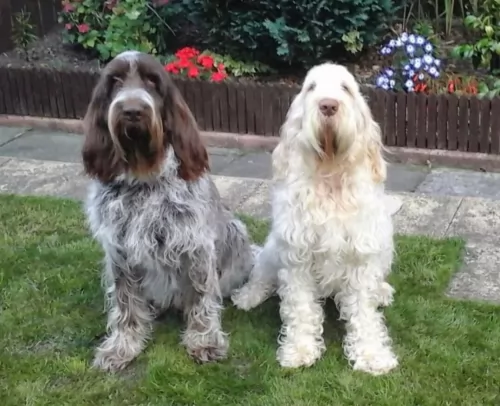 1Feeding the puppy – feed a high quality dog food for puppies of large breeds. Feed 3-4x day but don’t overfeed or let him exercise after eating even as a puppy.
1Feeding the puppy – feed a high quality dog food for puppies of large breeds. Feed 3-4x day but don’t overfeed or let him exercise after eating even as a puppy.
2.Feeding the adult - feed a high quality dog food for large breeds. Feed 1-2X day but don’t overfeed or let him exercise after eating.
4. Games and Exercises – The Spinone is an active breed, but not a fast dog. In fact, they like to travel at a trot so it becomes a great dog for jogging or running with. They love to jump, track, hunt, hike. They do well with agility, retrieving, flyball, carting, being a therapy dog, a rescue dog and a watchdog.